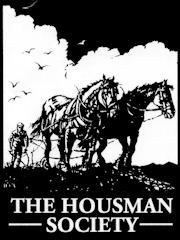A Shropshire Lad
|
Key: V: Textual Variation. C: Commentary. Q: Question. Glossary
ASL LII “Far in a western brookland”
Top ▲ Glossary
| Line | Word | Glossary |
| 1 | brookland | An area of marshy water-meadow. |
| 3 | poplars | A slender quick-growing tree of the willow family. |
| 16 | weirs | A dam built across a river to regulate the flow of water, divert it, or change its level. |
Top ▲ Commentary
| Line | Commentary |
| Date: July 1891 – 1891/2 (1st draft), 1891/2 (2nd draft) | |
| 1 | The influence of the West upon Housman’s poetic vision can be seen in the replacement of “pastoral“, “distant” and “cloven” in the drafts with “western” in the final version. |
| 1 | brookland: Jeremy Bourne in “The Westerly Wanderer” (1996) describes such an area behind Housman’s childhood home at Perry Hall in Bromsgrove. |
| meter | Four line stanzas of alternating seven and six syllable lines; even numbered lines rhyme. |
Top ▲ Variations
| Line | Text | Textual variation |
| 1 | D1 | <Far in a> \ <Deep> \ Far / in a / pastoral \ <distant> / \ <cloven> / woodland \ ploughland / |
| 1 | D2 | western brookland] <cloven ploughland> |
| 2 | D1 | bred me years] bred \ <loved> / me \ [?me] / <years> \ long / |
| 4 | D2 | pools] \ <streams> / |
| 5 | D1 | in the windless night-time,] <in the windless midnight,> \ when the night is windless, / ← in the windless <midnight> \ night-time / , |
| 6 | D1 | <The traveller ^ passing by ^ > ← The wanderer ^ marvelling why ^ |
| 7 | D1 | Halts] <Leans> |
| 9 | D1 | He hearkens; <long> \ <clean> / \ long / forgotten |
| 9 | D2 | no more remembered] long since forgotten (All editions before Nov 1922) |
| 10 | D1 | <In all that> [?country round] |
| 11 | D1 | <I lay me down and slumber> ← to slumber ← \ Here I lie down in London / |
| 11 | D2 | <I lay me down \ Here I lie down / in London> |
| 12 | D1 | <With [?round]> ← [?With] round. \ With leagues around. |
| 12 | D2 | <And turn to rest \ dreams / alone> |
| 13 | D1 | fences] palings |
| 13 | D2 | <palings> |
| 14 | D1 | wanderer] traveller |
| 15 | D1 | lingers] wanders |
| 16 | D1 | weirs] meres |
Top ▲ Questions
| Line | Question |
| 1 | Compare the effectiveness of the different alternatives in the drafts, “pastoral“, “distant” and “cloven” to the final version’s “western“. |
| 6 | At what is the wanderer “marvelling”? How do you explain the phenomenon? |
| 9 | Consider the difference between “no more remembered” of the final version and “long since forgotten” from the draft. |
| 11 | What does this poem add to the understanding of the separation in London of the narrator from his home? |
| 12 | Explore the difference between “turn to dreams alone” in the draft and “turn to rest alone” in the final version. |
| 15 | Does this line help to explain the phenomenon at l.6? |
